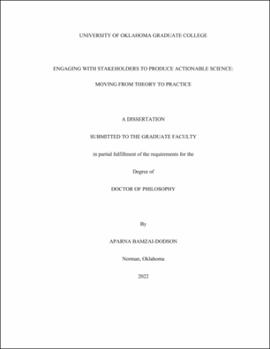| dc.description.abstract | Over time, the idea of the public value of federally funded science has slowly transitioned from basic science that helps fight disease and maintain national security (Bush 1945) to use-inspired science that directly informs decisions about the most urgent issues facing society, such as climate change (Lubchenco 1998, 2017). Natural and cultural resources across the world are already experiencing demonstrable impacts due to changes in our climate system, and stewards of these resources are turning to the scientific community for actionable science – information and tools that can be directly applied to decisions about how best to adapt to these future conditions (IPCC 2022). Such societal impact is more likely to be met when decision makers are engaged in the process of knowledge production (Ferguson et al. 2022). In response, public funders of climate science are changing how they design solicitations, review proposals, and make other programmatic decisions to encourage research to meet decision making needs (Arnott et al. 2020a). However, when the knowledge created does not fit decision contexts or is not used appropriately, vulnerability or contributions to climate change can instead increase and maladaptation can occur (Barnett and O’Neill 2010). Ensuring that engagement of decision makers in actionable science is carried out in a thoughtful and reflexive way is critical to achieving the desired societal impact.
In this dissertation, I examine three key questions regarding the engagement of stakeholders in the production of actionable climate adaptation science. First, how should researchers align their stakeholder engagement processes with their desired goals for societal impact and actionability? In Chapter 2, I propose a framework of engagement approaches that describes the wide variety of tools that are available for including stakeholders in the creation of actionable science, and I provide guidance on how researchers might consider tradeoffs among those approaches and tools. Second, how should researchers conduct engagement for societal impact in a way that maximizes benefits and minimizes harms to stakeholders? In Chapter 3, I analyze interviews (n=15) with stakeholders who were highly engaged in actionable climate adaptation science projects to examine their perspectives on the benefits and harms that they experienced, and I argue that researchers must proactively consider the ethical implications of engagement when developing their project idea. Third, how should researchers define successful societal impact and evaluate against such standards? In Chapter 4, I draw on the discipline of evaluation to develop a survey tool to examine the process, outputs, and outcomes of actionable science based on the perspectives of stakeholders engaged in those projects, and I analyze survey responses (n=49) in a case-study deployment of the tool.
In Chapter 5, I synthesize the findings from Chapters 2-4 and summarize key takeaways. Overall, I recommend that researchers thoughtfully consider stakeholder engagement goals and benefits as early as possible to best meet expectations of societal impact and actionability, ideally at or prior to the proposal development stage. Doing so in a robust manner often involves skills in which many biological and physical researchers may not be trained, requiring additional resources and expertise to be included in project plans. | en_US |

